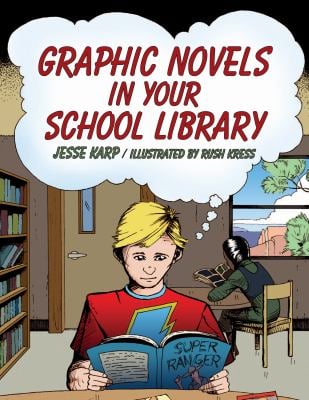 I'm telling you, it's hard to get semi-obscure reference books for a semi-rarefied audience reviewed in this day and age. It's an extra-sized delight, in that case, when one does pop up, and in Booklist no less, which says "most school libraries will benefit from this accessible and practical manual. Recommended."
I'm telling you, it's hard to get semi-obscure reference books for a semi-rarefied audience reviewed in this day and age. It's an extra-sized delight, in that case, when one does pop up, and in Booklist no less, which says "most school libraries will benefit from this accessible and practical manual. Recommended."
Thursday, March 29, 2012
Graphic Novels in Your School Library Review
 I'm telling you, it's hard to get semi-obscure reference books for a semi-rarefied audience reviewed in this day and age. It's an extra-sized delight, in that case, when one does pop up, and in Booklist no less, which says "most school libraries will benefit from this accessible and practical manual. Recommended."
I'm telling you, it's hard to get semi-obscure reference books for a semi-rarefied audience reviewed in this day and age. It's an extra-sized delight, in that case, when one does pop up, and in Booklist no less, which says "most school libraries will benefit from this accessible and practical manual. Recommended."
Thursday, March 22, 2012
Leave It to the Bard
 A comment by a graduate student in the sequential art class I teach at Pratt, lead me to an idea that came from Marc DiPaolo in his book War, Politics and Superheroes: Ethics and Propaganda in Comics and Film. He quotes William Shakespeare (from Twelfth Night) as saying "some men are born great, some achieve greatness and some have greatness thrust upon them." He goes on to apply this, respectively, to the characters of Superman, Batman and Spider-Man.
A comment by a graduate student in the sequential art class I teach at Pratt, lead me to an idea that came from Marc DiPaolo in his book War, Politics and Superheroes: Ethics and Propaganda in Comics and Film. He quotes William Shakespeare (from Twelfth Night) as saying "some men are born great, some achieve greatness and some have greatness thrust upon them." He goes on to apply this, respectively, to the characters of Superman, Batman and Spider-Man.This is, of course, an extremely astute comparison that places these characters on a great archetypal spectrum of heroism and points up what powerful and compelling icons superheroes can be. Ultimately, though, it seems to highlight just how far ahead of everything William Shakespeare actually was.
Thursday, March 15, 2012
The Sound of Independents
Among the many things serving on the Eisner committee has afforded me, the opportunity to read comics I don't usually find my way to has proven the most valuable thus far. I was never a huge reader of independent comics -- I'd read my share and I know the standards, but like many mainstream superhero fans (I assume), I just didn't tend to find my way back to them very often. Well, having read a slew of them over the last few weeks, I was bowled over by the talent, the narrative gambles, the unique aesthetic and the distinctive tones lurking between those covers.
 While superhero comics tend to concentrate on the extreme, exaggerating situations and personalities to create their drama and energy, indie comics create drama by finding the extraordinary within the mundane, as in Adrian Tomine's Optic Nerve 12, in which a gardener pursues his dream of creating "hortisculpture" at a huge social price. Sometimes the indies use the extraordinary to highlight the drama of everyday emotions and situations, like in Julia Gforer's Too Dark to See, in which a succubus (or . . . something) sows the seeds of destruction in a normal relationship, or in Michael DeForge's Lose #3, in which the trials of a forlorn and recently divorced father is played out against the backdrop of a post-apocalyptic world inhabited by dogs.
While superhero comics tend to concentrate on the extreme, exaggerating situations and personalities to create their drama and energy, indie comics create drama by finding the extraordinary within the mundane, as in Adrian Tomine's Optic Nerve 12, in which a gardener pursues his dream of creating "hortisculpture" at a huge social price. Sometimes the indies use the extraordinary to highlight the drama of everyday emotions and situations, like in Julia Gforer's Too Dark to See, in which a succubus (or . . . something) sows the seeds of destruction in a normal relationship, or in Michael DeForge's Lose #3, in which the trials of a forlorn and recently divorced father is played out against the backdrop of a post-apocalyptic world inhabited by dogs.
Sometimes it's hard to hear the quiet sound of a heartfelt conversation over all the superheroes punching each other and the zombies chomping on people's brains, but it turns out it might be worth listening to.
 While superhero comics tend to concentrate on the extreme, exaggerating situations and personalities to create their drama and energy, indie comics create drama by finding the extraordinary within the mundane, as in Adrian Tomine's Optic Nerve 12, in which a gardener pursues his dream of creating "hortisculpture" at a huge social price. Sometimes the indies use the extraordinary to highlight the drama of everyday emotions and situations, like in Julia Gforer's Too Dark to See, in which a succubus (or . . . something) sows the seeds of destruction in a normal relationship, or in Michael DeForge's Lose #3, in which the trials of a forlorn and recently divorced father is played out against the backdrop of a post-apocalyptic world inhabited by dogs.
While superhero comics tend to concentrate on the extreme, exaggerating situations and personalities to create their drama and energy, indie comics create drama by finding the extraordinary within the mundane, as in Adrian Tomine's Optic Nerve 12, in which a gardener pursues his dream of creating "hortisculpture" at a huge social price. Sometimes the indies use the extraordinary to highlight the drama of everyday emotions and situations, like in Julia Gforer's Too Dark to See, in which a succubus (or . . . something) sows the seeds of destruction in a normal relationship, or in Michael DeForge's Lose #3, in which the trials of a forlorn and recently divorced father is played out against the backdrop of a post-apocalyptic world inhabited by dogs.Sometimes it's hard to hear the quiet sound of a heartfelt conversation over all the superheroes punching each other and the zombies chomping on people's brains, but it turns out it might be worth listening to.
Thursday, March 8, 2012
Tease
 What We Become, the sequel to Those That Wake, is due out in February of 2013. That's just under a year, and yet the book is by and large ready. The editing is finished, the proof reading done, the flap copy approved. The paperback of Those That Wake (due out imminently) will mention the sequel's forthcoming release, but a year's a long time. Over the course of the year, I'm going to try to throw out a tease here and there.
What We Become, the sequel to Those That Wake, is due out in February of 2013. That's just under a year, and yet the book is by and large ready. The editing is finished, the proof reading done, the flap copy approved. The paperback of Those That Wake (due out imminently) will mention the sequel's forthcoming release, but a year's a long time. Over the course of the year, I'm going to try to throw out a tease here and there.Here's a line, completely out of context. I can't even disclose who's saying it for fear of giving too much away. But that's the idea of a tease, after all.
"Tell me, Laura, what is your life like now?"
Thursday, March 1, 2012
The Necessary Five
 Here is a list of the five graphic novels every collection of reading material ought to include, the five graphic novels that are most worthy of the term graphic literature. For what it's worth, they're not actually my five favorite graphic novels, but the ones that most epitomize and exemplify the art form. In democratic alphabetical order (by title), they are:
Here is a list of the five graphic novels every collection of reading material ought to include, the five graphic novels that are most worthy of the term graphic literature. For what it's worth, they're not actually my five favorite graphic novels, but the ones that most epitomize and exemplify the art form. In democratic alphabetical order (by title), they are:1. The Arrival by Shaun Tan
2. The Complete Maus by Art Spiegelman
3. Persepolis by Marjane Satrapi
4. Understanding Comics by Scott McCloud
5. Watchmen by Alan Moore and Dave Gibbons
Subscribe to:
Posts (Atom)